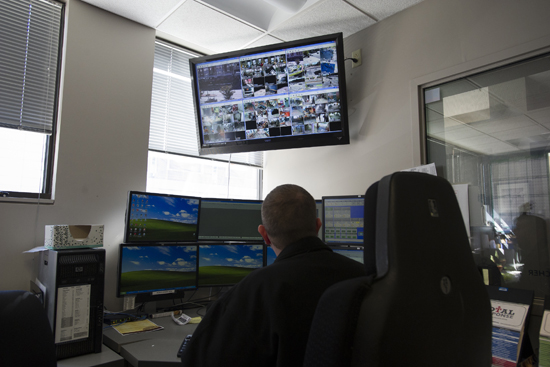BU Steps Up Security
Additional cameras being installed on both campuses

Senior civilian dispatcher Richard Churchill mans the monitors at BUPD. Photo by Cydney Scott
In the last year, security cameras have helped police find the suspects accused of stabbing a BU postdoctoral fellow in Brookline as well as the suspects in a series of armed robberies near campus. Now, at the behest of President Robert A. Brown, the University will increase the number of security cameras on both the Charles River and the Medical Campus. The cameras will be in place by October 31.
Scott Paré, the University’s deputy director of public safety and BU Police Department (BUPD) deputy chief, prefers not to say how many cameras will be added, or how many already exist, but he says the new cameras will be installed in areas such as Commonwealth Avenue, Bay State Road, and South Campus.
“These cameras will help us solve crimes,” says Paré. “They won’t prevent all crimes, but they will act as a deterrent. If criminals know we have camera coverage, they might think twice.”
Paré expects the new pan-tilt-zoom cameras, which can be controlled remotely from BUPD headquarters to move and zoom in, will help to ward off would-be criminals at hot spots such as bike racks. And they will allow dispatchers to keep an eye on the location of many incidents before officers arrive. They will also help BUPD gauge large crowds and traffic situations at major campus events such as Commencement and Move-in. “It’s almost like having another officer on the scene,” Paré says.
Peter Fiedler (COM’77), vice president for administrative services, says the project has taken months, because of the different components involved. BUPD is working with Facilities Management & Planning to prepare the buildings for mounting and drilling and with Information Services & Technology to run data lines and coordinate servers.
For people with concerns about privacy, Paré and Fiedler stress that cameras are installed only in public areas. “We’re not snooping,” Fiedler says. “BUPD will be the only ones with the authority to access the cameras. These cameras will really aid BUPD in their efforts to deter crime and ensure public safety.”
Comments & Discussion
Boston University moderates comments to facilitate an informed, substantive, civil conversation. Abusive, profane, self-promotional, misleading, incoherent or off-topic comments will be rejected. Moderators are staffed during regular business hours (EST) and can only accept comments written in English. Statistics or facts must include a citation or a link to the citation.